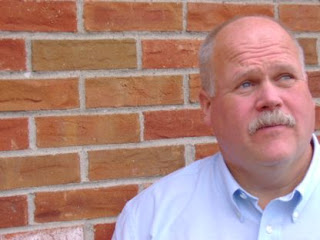Going out for breakfast is always an adventure; yesterday was no exception. Linda and I went to one of my favorite places - Knead the Dough. For reasons of God's design I have the gift of going somewhere and attracting people.
One of the people that was snared in this net was a gentleman whom we first made contact with two years ago while Christmas caroling in the neighborhood. He and his family had just moved here and we were the first people to stop at his new home and make them feel a part of a larger community. My guest is a band teacher at a school in Buffalo.
In the course of our conversation he shared that much of his wife's family are latino and speak mostly spainish. We shared with him that during the summer we had several Mexican migrants who came to worship and that we had someone in the church who would translate my messages into espanol. The extent of my spainish is non-existent. I don't know the language, and when I do hear it spoken, I feel left out and confused, which quickly turns to frustration and me just shutting it out.
In the hispanic community there are some unique language and cultural issues. First generation immigrants hispanics are mostly spainsih speaking only and maintain the traditions of the previous country. Second generation hispanics, for the most part desire to be assimilated into American culture, and their primary language is english and in a lot of cases they have rejected the tradition and language of their parents country. Third generation hispanics seem to have an identity crisis. They try to rediscover their roots, but reject both of the previous generations cultures and have developed their own language - spanglish - a combination of both languages which is deeply rooted in a slang. This this generation is no longer interested in assimilation, but is about latino pride and domination.
My friend shared with me that he attended a seminar where the speaker presented the concept of slang, informal, and formal registries. He noted that all of us sitting at the table could easily switch from our formal registry, using proper grammar and syntax, and yet also be able to use slang and informal registry - knowing when it was appropriate to use which and be able to effectively move between them. It seems that in this current generation of texting and instant messages, there is the inability to grasp the formal registry and therefore has prohibited this generation in its ability to communicate effectively.
As I have been thinking about this - there is a point here - the Scripture occured to me...
In 2nd Corinthians it reads:
14The man without the Spirit does not accept the things that come from the Spirit of God, for they are foolishness to him, and he cannot understand them, because they are spiritually discerned. 15The spiritual man makes judgments about all things,
Before Christ we are only able to understand and hear one language. When we came into contact with Spirit-filled people we weren't able to understand. Only as the Holy Spirit opened our eyes and hearts to the things of the Spirit were we able to know and understand this language. Knowing this language of the Spirit also puts in the unique place of being able to understand both worlds and become bi-lingual so to speak.
Are you able to discern the things of the Spirit? Are you able to speak from your spiritual registry and communicate to others? Who today will you "speak their language" with so that they might hear words of life transforming Hope and Good News?
I now believe I'm bi-lingual - who knew?! LOL
Subscribe to:
Post Comments (Atom)

1 comment:
Speaking more to the first part of your post then the second, the interesting thing is that despite the informal and formal contextual elements, we're really saying the same thing. For instance, I say "cool", and older gent says "dandy", and a younger person says "fierce". All three of us could mean the exact same thing, though the meaning is expressed differently.
In the same way, is the spiritual expressing the same referent as the older, less specific way of saying things? Is it merely a transformation in expression, or a transformation in experience? Which suggests more ignorance?
itsalldicta.blogspot.com
Post a Comment